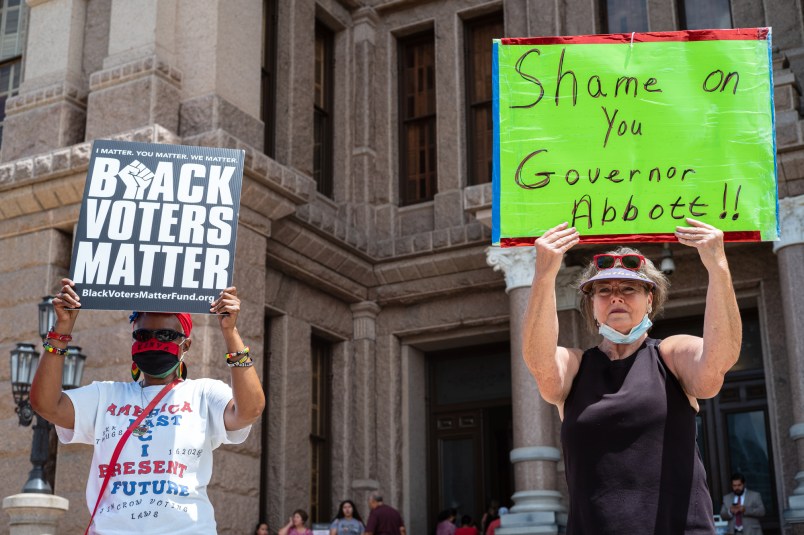As they get their second bite at the voting restriction apple during a special session, Texas Republicans are following the outline of a bill so egregious it prompted a strategic Democratic walkout that succeeded in killing it — temporarily.
The new bills ban 24-hour and drive-through voting, embolden and empower partisan poll watchers and up the penalties for election workers who do not comply with regulations, among other things. The raft of new restrictions is encapsulated in the newly filed House Bill 3 and Senate Bill 1.
One restriction left out of the new legislation is a ban on Sunday morning voting, a restriction that seemed aimed at hobbling “Souls to the Polls,” efforts to organize and mobilize Black churchgoers. Republicans claim it was a typographical error in the first version of the bill; Democrats say that outrage shamed them into removing it.
The Senate version will have its first public hearing Saturday morning, scheduling that critics say was planned to purposefully curtail the time people could hear about and read up on the legislation and go testify.
Texas Democrats, a minority in both chambers, were able to temporarily kill the original version of these bills by strategically leaving the House floor a few members at a time as the hours ticked down at the end of the regular session. They ultimately deprived the House of the needed two-thirds quorum, preventing votes on the elections overhaul and other bills.
Gov. Greg Abbott (R) insisted that the bills be passed in a special session, claiming that the legislation falls under the auspices of “election integrity,” though voter fraud is exceedingly rare and often used as a cover to pass suppressive voting laws.
Texas has already made it incredibly difficult to vote, and these new bills take aim specifically at some innovations used by large urban counties in 2020 to expand the franchise. Texas Democrats, who recently travelled to Washington D.C. to meet with federal lawmakers, say there’s only so much they can do to block the legislation pushed by the majority-Republican chambers.
However, federal voting safeguards currently have no chance of passing with the filibuster in place, something Sens. Kyrsten Sinema (D-AZ) and Joe Manchin (D-WV) ensure.
Of the two major pieces of voting legislation — the For the People Act and John Lewis Voting Rights Act — a total of one Republican, Sen. Lisa Murkowski (R-AK), has expressed support of either one. The support of 10 Republicans is needed to overcome the filibuster.







Fuck Abbott and the chair he rode in on.
All of the states that have been identified as starting to lean Democratic are being nailed shut right in front of our eyes, and the SCOTUS has essentially said “go for it”.
It was fun while it lasted. Can’t wait to see how much Sinema loses her next election by. Fucking narcissistic idiot.
FUCK
JOE
MANCHIN
Die in a fire, discobot.
I can’t wait for he violence to start. It’s coming. we might as well just get it over with. This shit simply can’t stand.
I really wonder if people in Texas will accept the Republicans working so hard to remove their ability to vote. All they are doing here is making their maneuvers blatantly obvious, and doing it in a way that makes a big splash. It’s going to attract a lot more news than sneaking it through during the regular legislation period. At some level, people should understand how this is curtailing their rights, and the rights of others, to vote in an election…it’s possible they get enough people pissed off that they come out in 2022 and vote down the Republicans.
I guess we’ll see…it’s a desperate move for sure.